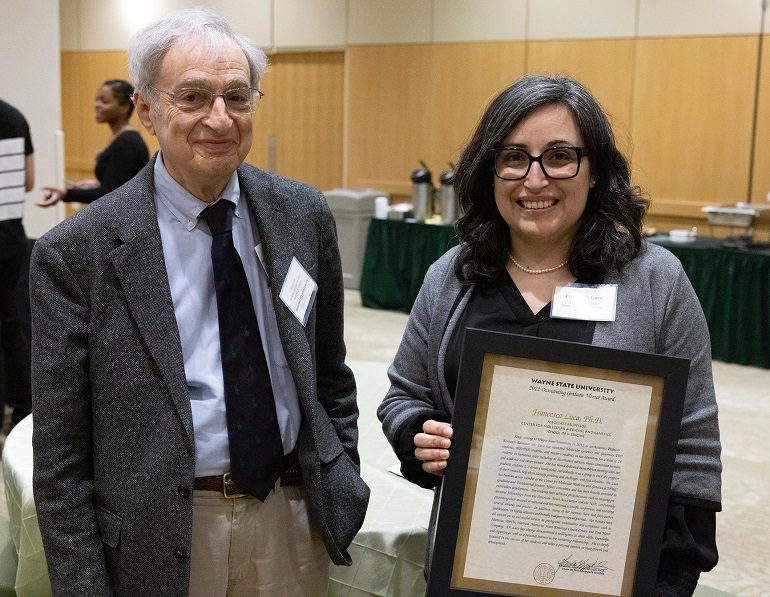
Wayne State University’s Office of the Provost has selected School of Medicine faculty member Francesca Luca, Ph.D., to receive its Outstanding Graduate Mentor Award.
Dr. Luca is an associate professor in the Center for Molecule Medicine and Genetics, and of Obstetrics and Gynecology. She received the award at the Academic Recognition Ceremony held April 28 at the Student Center.
“I felt extremely honored and truly happy to receive this award,” Dr. Luca said. “It is a special award in my opinion, because the evaluation is based not only on the applicant’s CV as with other awards, but importantly it includes letters of reference from current and former graduate students. This is what makes this award special to me, knowing that I have made a positive impact on the students I have trained, to the extent that they felt comfortable writing positive letters for me.”
The award honors faculty members who are recognized by their departments and graduate students as superb graduate mentors. Four awards are made annually in the areas of natural sciences and engineering; the health sciences; social sciences, education and business; and the arts and humanities.
Since coming to Wayne State as an assistant professor in 2012, Dr. Luca has mentored 24 students in various stages of their educational journey. Her lab focuses on understanding the genetic and molecular basis of inter-individual and inter-population differences in complex phenotypes of biomedical interest. They combine evolutionary and functional genomics approaches to study intermediate phenotypes (e.g.: transcription factor binding, gene expression, chromatin accessibility) and how they are affected by gene-environment interactions.
“I don’t think I have the recipe to be an outstanding mentor. In my case, it’s a role in constant evolution,” she said. “When I started mentoring students, I was a student myself, back during my Ph.D. years. At the beginning, my mentoring style was strongly influenced by my current and former mentors. With time, my mentoring style has evolved, influenced primarily by what I learned from the students I was mentoring, but also by my personal life.”
What she learned is that each student has unique mentoring needs. She can leverage previous experience, but needs to devise a personalized mentoring approach for each.
“From a personal point of view, becoming a mother has had the biggest impact on my mentoring style, and vice-versa, being an academic mentor also helps me with my parenting skills. As human beings, we have a commitment toward younger generations to pass along our knowledge. My strongest motivation as teacher and mentor is in stimulating in the students a passion for science by awakening their sense of curiosity,” she said. “Overall, the goal of my mentoring activities is to prepare the students to become the next generation of scientists and critical interpreters of human genetics and genomics, a fast-developing scientific field.”
She is now mentoring a doctoral student, a M.D./Ph.D. student and a master’s student.
“Designing a new project and analyzing/interpreting new results is always very exciting, but even more so when the experience is shared with students and postdocs. The excitement of a student when an experiment finally works is absolutely contagious! The most rewarding part of my job, though, is seeing a trainee gaining independence and confidence as they move along their career path,” she said.
Learn more about Dr. Luca’s mentees and her research at www.lucalab.org.